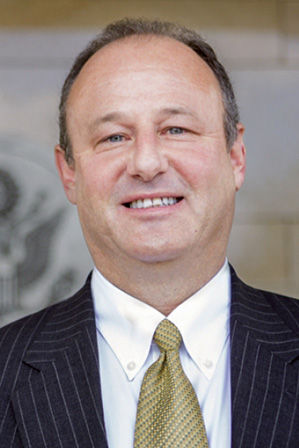Those Who Forget History…
President’s Views
BY ERIC RUBIN

The final U.S. withdrawal from Afghanistan last August was an excruciating moment: for our country, for our military, for the Foreign Service and for the Afghan people. It brought to an end 20 years of struggle, sacrifice and, ultimately, failure. Thousands of our Foreign Service colleagues either served in Afghanistan or worked on Afghanistan issues and programs. Combined with the several thousand who served in Iraq during the same two decades, at least a quarter of our colleagues took part in these wars and nation-building efforts. That experience marked them, and it changed our Service and our lives in fundamental ways.
There are several inquiries underway into the circumstances of our last months in Afghanistan. Both the Special Inspector General for Afghanistan Reconstruction and the Department of State have commissioned reviews of what happened, what went wrong and what lessons can be learned. Those efforts focus, however, on the withdrawal itself. To date, there has been no comprehensive historical review of America’s 20 years in Afghanistan—nor has there been such a review of the same 20 years of U.S. intervention in Iraq. We need both.
AFSA does not take positions on policy matters or politics, and as an active-duty member of the Foreign Service, I do not either. It is not political, however, to ask that we step back and assess this painful and ultimately unsuccessful chapter in our history, the diplomatic and foreign assistance angles as well as the military side.
This is our chapter of American history as well. It deserves a thorough, non-partisan and unstinting review. Our country undertook such an effort in the 1970s after our bloody failure in Southeast Asia. The past 20 years deserve no less serious attention.
The women and men of the U.S. Foreign Service can and should be proud of their contributions to the effort to make the world safer after 9/11. Our colleagues sacrificed in many ways. Some gave their lives, a small number in comparison to the grievous losses of our military, but terribly painful nonetheless. Most served apart from their families, friends and regular lives, almost always under dangerous conditions and at times in truly frightening circumstances.
We cannot succeed if we fail to study and understand what went wrong.
They did so because service to our nation is who we are and what we are about, because we answer the call to serve where needed, and because they hoped to make a bad situation better.
Many came home with PTSD and other lasting effects that initially were met with skepticism, indifference and neglect. Some still carry psychological and physical wounds to this day. All deserve not only our deep thanks and respect, but also our support and understanding.
The courage, skill and outright heroism of our colleagues who volunteered to assist with the final evacuation from Afghanistan deserve our highest respect and gratitude. Together with their brave colleagues from the U.S. military and intelligence community, they pulled off the greatest human airlift in history: more than 120,000 people rescued in about 10 days. Many of them witnessed scenes of tragedy and desperation that will stay with them for the rest of their lives.
The United States failed to save all the Afghan allies whose service to our country and theirs put their lives in jeopardy. This job is not yet finished, and we must continue to insist that the United States work to get to safety the rest of those who helped us. We must, not only as a matter of humanity and honor, but because this crisis will be remembered by others whose help we may need in other places in the future.
In this and future issues of the FSJ, we are publishing firsthand accounts of the evacuation from colleagues who were there. As our country seeks to find its footing and secure its leadership role in the current unstable world, we cannot succeed if we fail to study and understand what went wrong, in Afghanistan as well as Iraq. We must also consider the ways the experience of the past 20 years changed and challenged the Foreign Service.
Will the right lessons be learned? I sincerely hope so.

